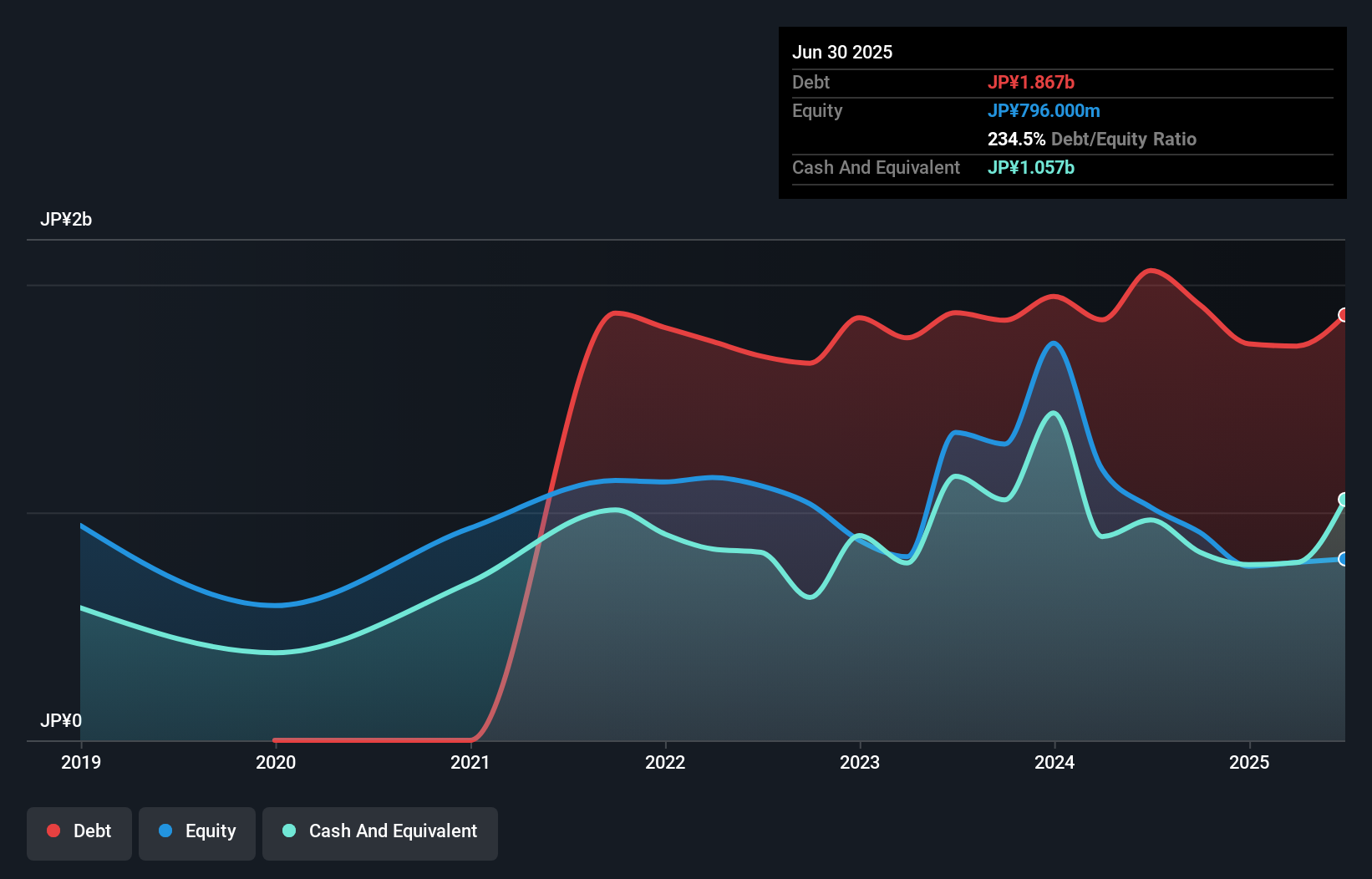Warren Buffett famously said, ‘Volatility is far from synonymous with risk.’ It’s only natural to consider a company’s balance sheet when you examine how risky it is, since debt is often involved when a business collapses. We can see that Tokyo Communications Group,Inc. (TSE:7359) does use debt in its business. But is this debt a concern to shareholders?
We’ve found 21 US stocks that are forecast to pay a dividend yield of over 6% next year. See the full list for free.
Why Does Debt Bring Risk?
Generally speaking, debt only becomes a real problem when a company can’t easily pay it off, either by raising capital or with its own cash flow. Part and parcel of capitalism is the process of ‘creative destruction’ where failed businesses are mercilessly liquidated by their bankers. However, a more usual (but still expensive) situation is where a company must dilute shareholders at a cheap share price simply to get debt under control. Of course, plenty of companies use debt to fund growth, without any negative consequences. When we examine debt levels, we first consider both cash and debt levels, together.
What Is Tokyo Communications GroupInc’s Net Debt?
The image below, which you can click on for greater detail, shows that Tokyo Communications GroupInc had debt of JP¥1.87b at the end of June 2025, a reduction from JP¥2.06b over a year. However, because it has a cash reserve of JP¥1.06b, its net debt is less, at about JP¥810.0m.
 TSE:7359 Debt to Equity History November 13th 2025 How Strong Is Tokyo Communications GroupInc’s Balance Sheet?
TSE:7359 Debt to Equity History November 13th 2025 How Strong Is Tokyo Communications GroupInc’s Balance Sheet?
Zooming in on the latest balance sheet data, we can see that Tokyo Communications GroupInc had liabilities of JP¥2.25b due within 12 months and liabilities of JP¥663.0m due beyond that. Offsetting this, it had JP¥1.06b in cash and JP¥634.0m in receivables that were due within 12 months. So its liabilities total JP¥1.23b more than the combination of its cash and short-term receivables.
While this might seem like a lot, it is not so bad since Tokyo Communications GroupInc has a market capitalization of JP¥3.83b, and so it could probably strengthen its balance sheet by raising capital if it needed to. However, it is still worthwhile taking a close look at its ability to pay off debt.
See our latest analysis for Tokyo Communications GroupInc
In order to size up a company’s debt relative to its earnings, we calculate its net debt divided by its earnings before interest, tax, depreciation, and amortization (EBITDA) and its earnings before interest and tax (EBIT) divided by its interest expense (its interest cover). Thus we consider debt relative to earnings both with and without depreciation and amortization expenses.
Tokyo Communications GroupInc’s net debt is sitting at a very reasonable 1.7 times its EBITDA, while its EBIT covered its interest expense just 5.0 times last year. It seems that the business incurs large depreciation and amortisation charges, so maybe its debt load is heavier than it would first appear, since EBITDA is arguably a generous measure of earnings. Notably, Tokyo Communications GroupInc made a loss at the EBIT level, last year, but improved that to positive EBIT of JP¥121m in the last twelve months. The balance sheet is clearly the area to focus on when you are analysing debt. But you can’t view debt in total isolation; since Tokyo Communications GroupInc will need earnings to service that debt. So when considering debt, it’s definitely worth looking at the earnings trend. Click here for an interactive snapshot.
Finally, a company can only pay off debt with cold hard cash, not accounting profits. So it is important to check how much of its earnings before interest and tax (EBIT) converts to actual free cash flow. Happily for any shareholders, Tokyo Communications GroupInc actually produced more free cash flow than EBIT over the last year. That sort of strong cash generation warms our hearts like a puppy in a bumblebee suit.
Our View
Happily, Tokyo Communications GroupInc’s impressive conversion of EBIT to free cash flow implies it has the upper hand on its debt. And we also thought its net debt to EBITDA was a positive. All these things considered, it appears that Tokyo Communications GroupInc can comfortably handle its current debt levels. On the plus side, this leverage can boost shareholder returns, but the potential downside is more risk of loss, so it’s worth monitoring the balance sheet. When analysing debt levels, the balance sheet is the obvious place to start. However, not all investment risk resides within the balance sheet – far from it. For instance, we’ve identified 3 warning signs for Tokyo Communications GroupInc (1 can’t be ignored) you should be aware of.
If, after all that, you’re more interested in a fast growing company with a rock-solid balance sheet, then check out our list of net cash growth stocks without delay.
Valuation is complex, but we’re here to simplify it.
Discover if Tokyo Communications GroupInc might be undervalued or overvalued with our detailed analysis, featuring fair value estimates, potential risks, dividends, insider trades, and its financial condition.
Access Free Analysis
Have feedback on this article? Concerned about the content? Get in touch with us directly. Alternatively, email editorial-team (at) simplywallst.com.
This article by Simply Wall St is general in nature. We provide commentary based on historical data and analyst forecasts only using an unbiased methodology and our articles are not intended to be financial advice. It does not constitute a recommendation to buy or sell any stock, and does not take account of your objectives, or your financial situation. We aim to bring you long-term focused analysis driven by fundamental data. Note that our analysis may not factor in the latest price-sensitive company announcements or qualitative material. Simply Wall St has no position in any stocks mentioned.


AloJapan.com